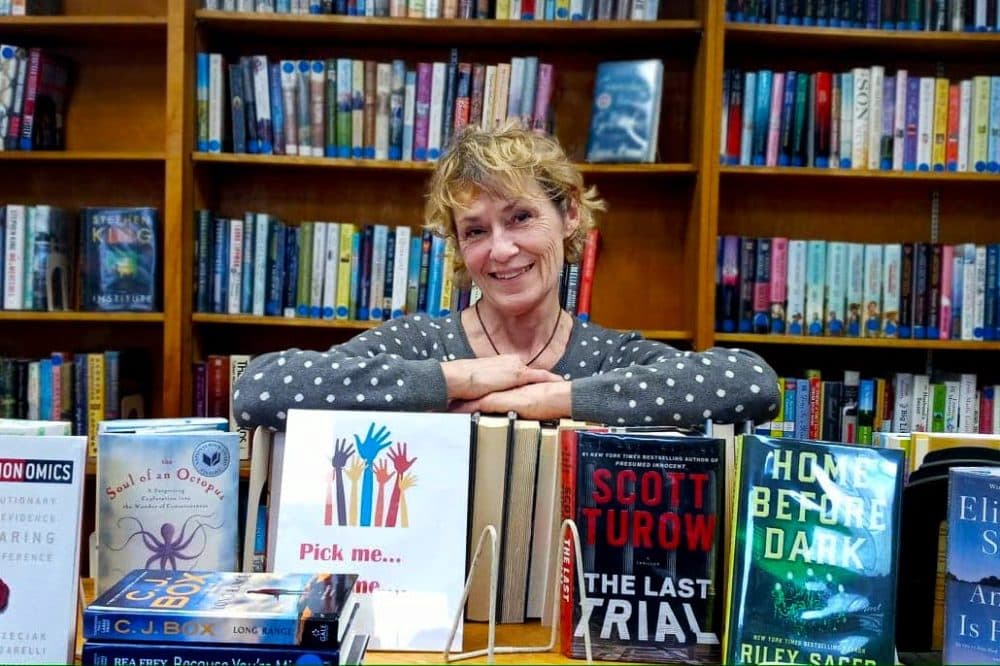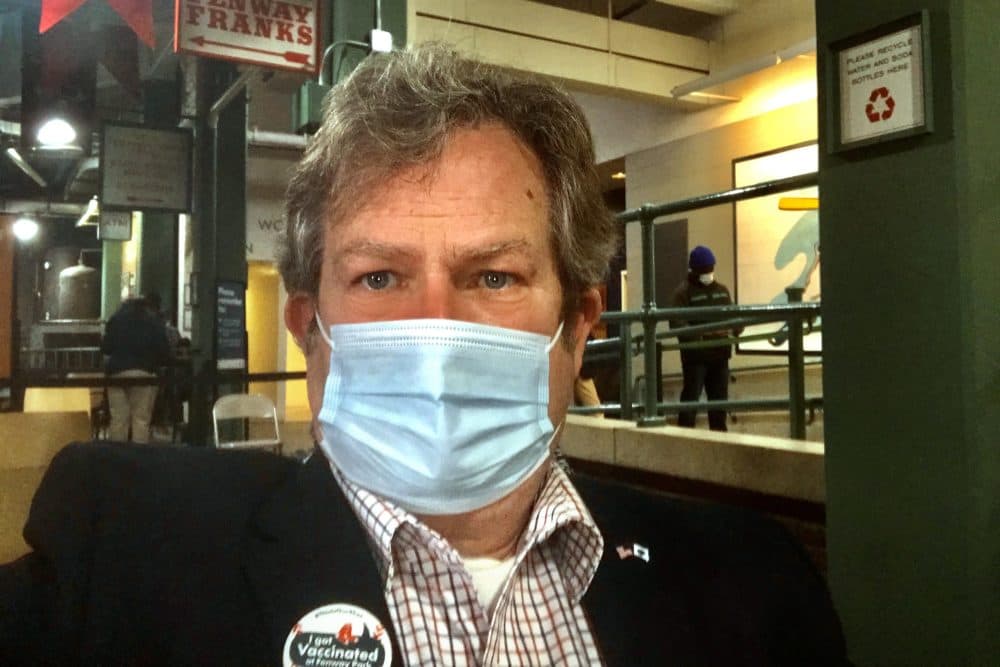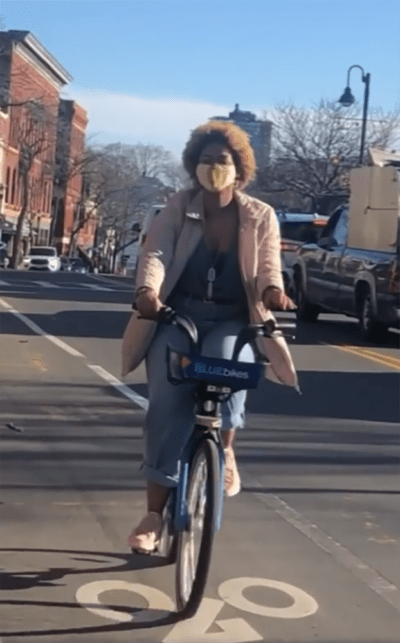Advertisement
Coronavirus Coverage
Combating COVID Vaccine Hesitancy May Be Next Battle For Mass.
ResumeTraducido en español por El Planeta Media.
All Massachusetts residents age 16 and older can now sign up for a COVID-19 vaccine, but that doesn’t mean everyone eligible will want the shot.
In the coming weeks, state public health officials expect demand to slow down, and the hardest push, many believe, will be reaching out to those who are reluctant. That includes Republican men, who were some of the most hesitant in recent national polling.
Town clerk and librarian Jodie Paradis has seen this hesitation in Russell, a town of just under 2,000 residents in southwestern Massachusetts. Russell is 96% white and mostly Republican. In 2020, nearly 60% of voters there supported Donald Trump in the presidential election, the largest percentage in the commonwealth.
“I think a lot of Russell residents will choose not to get the vaccine,” Paradis said. “They truly either believe that it [COVID] is not real or that it’s no worse than the common cold.”

Paradis says she hears many concerns from residents about the vaccine.
“That the vaccine was created much too quickly and may not be reliable at all,” she explained, “but also just a suspicion of what we could be injected with.”
These concerns are not unique to Republicans or Trump voters. Misinformation about the vaccine abounds online. But national polling suggests they are some of the most likely to say they won’t get the COVID vaccine.
A recent NPR/PBS/Marist poll found 49% of Republican men and 47% of voters who supported Trump don’t plan to get the shot. And respondents from rural areas were also more reluctant.
There are outreach efforts underway across the state to urge as many residents as possible to get vaccinated, including even a video from former Red Sox all-star David Ortiz.
But celebrity videos and advertising campaigns likely won’t work for everyone, according to Anthony Dell'Aera, an assistant political science professor at Worcester State University. Dell’Aera says concerns that come from an ideological mistrust of government will be very hard to change.
“If anyone can persuade them it’s likely to be people in their own immediate circles, like family or friends, or clergy or their own doctor,” he said, not public figures.
Dell'Aera thinks a more personal touch is likely to have a bigger impact. That’s the approach Tom Mountain, vice chair of the Massachusetts Republican Party, has embraced. He says many of his conservative friends are skeptical, and he was too, until he got COVID last December. Since then, Mountain says he has been telling everyone in his circle to get vaccinated. His pitch: "The COVID virus is lethal, it’s real, it’s out there, and it is not going to go away unless everybody gets vaccinated."
“And by everybody, I mean everybody,” he said.

It’s not just Republican men who are concerned about the vaccine. Medical providers say they encounter hesitancy from many different corners, although a recent poll shows a majority of Massachusetts residents overall do plan to get it.
“In general the populations are not monolithic. We are seeing distrust across the board,” said Dr. Evan Benjamin, chief medical officer of Ariadne Labs in Boston, adding that the main concerns are: is it safe, does it work, and can it be trusted?
The best person to answer these questions, Benjamin says, is a primary care doctor who is already trusted by patients. That’s why his team is developing a conversation guide to help facilitate these doctor-patient discussions.
“Our approach is to really listen — to really understand and validate the concerns, and try to get accurate information to give people a sense of empowerment over this very personal decision of should they receive the vaccination or not,” Benjamin said.
Dr. June-Ho Kim at Brigham and Women’s Hospital, who is affiliated with the Ariadne Labs initiative, said this approach has worked well with his patients. He warns that as demand for vaccines shrinks, it will be important to avoid generalizations about those who are hesitant.
“There are subpopulations and communities within those communities,” Kim said. “And even amongst those communities, just because a survey says it is all white evangelical Christians, that doesn’t mean everyone feels the same way because of the same reason.”

To convince those who are hesitant, vaccines must be as easy to get as possible, says Shan Soe-Lin, managing director at Pharos Global Health Advisors in Boston. Soe-Lin suggests keeping vaccination sites open on weekends and at night, providing paid time off to get vaccinated and even handing out cash bonuses or vouchers as an incentive, particularly for younger adults.
“This race isn’t over yet, the virus is still winning,” Soe-Lin said. “So the fastest that we can get this hardest, last tail of people vaccinated and protected is everything. This is a race for lives.”
Another approach may be to keep the message positive and try to take politics out of the equation.
Keona Wynne, a doctoral student at Harvard T.H. Chan School of Public Health, is trying to do that in a colorful way by making parody videos and posting them on social media. Her latest video, a rap remix, shows her dancing and biking around Boston chanting, “All my East Coast players get the vax, get the vax, get the vax.”
Wynne is helping to organize Boston Vaccine Day, a proposed holiday advocates are pitching to Mayor Kim Janey for Sept. 3, the Friday before Labor Day. The idea is to celebrate vaccinations with events across the city, such as block parties, live music, basketball tournaments and yoga in the park.
Wynne is part of a push in Washington, D.C., to make the day a one-time national holiday.
“We want people to feel empowered and like we are getting something back, and we are able to rejoin each other in community,” she said. “And by giving that date it gives us a common shared purpose, and I think that is pretty powerful and a real motivator.”
This segment aired on April 19, 2021.